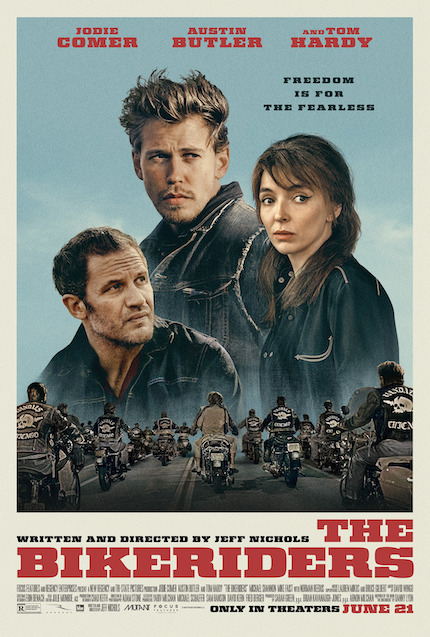THE BIKERIDERS Review: Jeff Nichols Soulfully Deconstructs '60s-Era Masculinity
Jodie Comer, Austin Butler and Tom Hardy star in a new film by Jeff Nichols.

In The Bikeriders, writer-director Jeff Nichols’s (Loving, Midnight Special, Take Shelter) first film in nearly a decade (offset, in part, by a year-long delay caused by the writer’s strike and a studio/distributor switch), Johnny (Tom Hardy), the founder and leader of the ‘60s-era Vandals MC (Motorcycle Club), finds inspiration for his riding club arrives in the form of the television broadcast of Marlon Brando’s seminal 1953 outlaw biker flick, The Wild One.
It’s the first — though far from the last — example of pop culture art, initially influenced by the real world, reflecting an idealized, romanticized version to the intended consumers of pop cultural art and artifacts like The Wild One.
Everything about Brando’s performative masculinity, from his leather jacket, his 1950 6T Triumph Thunderbird motorcycle, and more importantly, his outsider, rule-breaking attitude influence Johnny, a working-class motorcycle enthusiast with a wife, two kids, and presumably, a mortgage, to kickstart the Vandals MC. Johnny initially starts the Vandals as a weekend racing club and later, in its most enduring form, as a riding club.
Unconsciously tapping into post-WWII disillusionment, the ever-growing debacle in Vietnam, and the primitive, instinctual tribalism inherent in our genetic makeup, Johnny becomes successful beyond the initial idea gleaned from Brando's performance, look, and attitude in The Wild One.
Told, sometimes clumsily, often awkwardly, through two, mostly passive-reactive observers, Danny (Mike Faist), a writer, photographer, and adherent of New Journalism and its brand of immersive, subjective reporting, who records practically every word, phrase, or grunt uttered by Johnny and his ever-growing club, and Kathy (Jodie Comer, adopting a risky Midwestern twang), the onetime girlfriend-turned-wife of Johnny’s closest associate and friend, Benny (Austin Butler), The Bikeriders takes an allusive, loosely structured ride through the Chicago-adjacent highways, byways, and streets that irresistibly draw Johnny, Benny, and the others across the back half of the turbulent ‘60s.
Directly inspired by real-world photojournalist Danny Lyons’s 1968 book of the same name, Nichols spins a highly fictionalized, sprawling account of the Vandals’s real-world equivalent, the Outlaws MC, descent from the equivalent of a social club to a criminal gang. He’s also far less concerned with a conventional narrative through-line beyond the devolution of the Vandals from a working-class club obsessed with a specific kind of performative masculinity, a masculinity dependent on bonding rituals involving prodigious amounts of alcohol, rule-breaking, and bare-fisted violence to the inevitable turn toward higher-end forms of criminality (e.g., drug smuggling/running, violent territorial disputes, murders-for-hire).
Nichols centers The Bikeriders’s two-hour running time on the unrequited triangle involving Johnny, Benny, and Kathy. While Kathy marries Benny only five or six weeks after meeting Benny, leaving her longtime boyfriend in the process, Johnny — and more importantly, the illusory forms of freedom he represents — keep Benny inextricably, maybe even irrevocably, tied to Johnny and the Vandals. Benny repeatedly finds himself caught between the settled domesticity that Kathy represents and the freedom of the boundless, endless open road, however illusory, that Johnny symbolizes for him.
Where Kathy simply wants a husband and maybe a father to her unborn children, Johnny sees the unquestioningly loyal Benny as heir apparent to the leadership of the Vandals MC, a responsibility the commitment-phobic Benny initially rejects. Even as Johnny begins to belatedly recognize that the Vandals MC and its far-flung chapters have metastasized beyond his control into a criminal gang, he remains fixated on Benny as the Vandals MC’s next leader, using Benny’s rejection of the power inherent in leading the MC as an additional rationale (i.e., he who wants it least deserves it most).
As a straightforward, dialectical tension, the supposed externalization of Benny’s inner conflict holds more promise than Nichols chooses to deliver. Despite his thematic and narrative centrality, Benny never emerges as anything except an enigmatic cipher. He’s defined by a modest collection of traits, the absence of a past or background beyond a handful of words passed by one character to another when we — through Kathy’s eyes — see him hovering over a pool table, his thoughts, ideas, and impulses a mystery.
Nichols’ script gives both Hardy, a master brooder with few peers, and Comer, an expressive, nimble performer, the kind of dialogue typically earmarked for awards presentations; Butler gets almost the exact opposite, leaving him with far fewer lines, presumably symptomatic of his character’s limitations. As such, Nichols often leaves Butler to exude brooding coolness, either at the club’s central bar hangout he frequents or on his motorcycle (helmet-free, of course), leaving the audience, if not entirely adrift, then forced to recognize that Benny’s shrouded inner life expressed through his behavior, clothes, and attitude, are merely one performance, some, like Johnny’s more destructive than others, available to Benny’s generation.
The Bikeriders opens Friday, June 21, only in movie theaters, via Focus Features. Visit the official site for more information, including locations and showtimes.
The Bikeriders
Director(s)
- Jeff Nichols
Writer(s)
- Jeff Nichols
Cast
- Jodie Comer
- Austin Butler
- Tom Hardy







